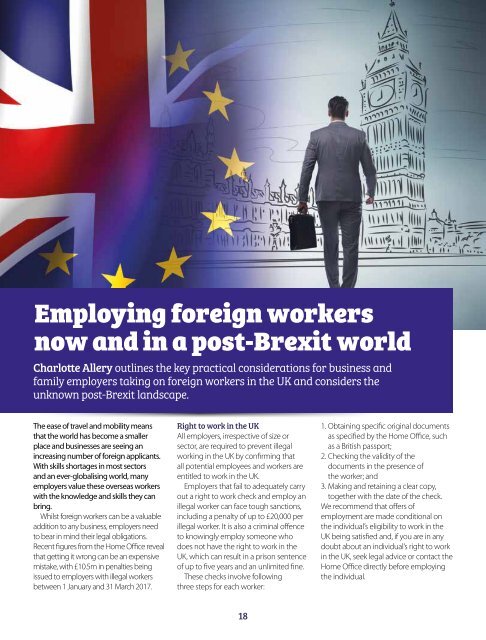Comment Magazine Issue 7
Create successful ePaper yourself
Turn your PDF publications into a flip-book with our unique Google optimized e-Paper software.
Employing foreign workers<br />
now and in a post-Brexit world<br />
Charlotte Allery outlines the key practical considerations for business and<br />
family employers taking on foreign workers in the UK and considers the<br />
unknown post-Brexit landscape.<br />
The ease of travel and mobility means<br />
that the world has become a smaller<br />
place and businesses are seeing an<br />
increasing number of foreign applicants.<br />
With skills shortages in most sectors<br />
and an ever-globalising world, many<br />
employers value these overseas workers<br />
with the knowledge and skills they can<br />
bring.<br />
Whilst foreign workers can be a valuable<br />
addition to any business, employers need<br />
to bear in mind their legal obligations.<br />
Recent figures from the Home Office reveal<br />
that getting it wrong can be an expensive<br />
mistake, with £10.5m in penalties being<br />
issued to employers with illegal workers<br />
between 1 January and 31 March 2017.<br />
Right to work in the UK<br />
All employers, irrespective of size or<br />
sector, are required to prevent illegal<br />
working in the UK by confirming that<br />
all potential employees and workers are<br />
entitled to work in the UK.<br />
Employers that fail to adequately carry<br />
out a right to work check and employ an<br />
illegal worker can face tough sanctions,<br />
including a penalty of up to £20,000 per<br />
illegal worker. It is also a criminal offence<br />
to knowingly employ someone who<br />
does not have the right to work in the<br />
UK, which can result in a prison sentence<br />
of up to five years and an unlimited fine.<br />
These checks involve following<br />
three steps for each worker:<br />
1. Obtaining specific original documents<br />
as specified by the Home Office, such<br />
as a British passport;<br />
2. Checking the validity of the<br />
documents in the presence of<br />
the worker; and<br />
3. Making and retaining a clear copy,<br />
together with the date of the check.<br />
We recommend that offers of<br />
employment are made conditional on<br />
the individual’s eligibility to work in the<br />
UK being satisfied and, if you are in any<br />
doubt about an individual’s right to work<br />
in the UK, seek legal advice or contact the<br />
Home Office directly before employing<br />
the individual.<br />
Employment rights<br />
Foreign employees working for<br />
employers in the UK will be entitled<br />
to the same employment rights as UK<br />
citizens, such as the National Minimum<br />
Wage, paid annual leave and protection<br />
from discrimination.<br />
However, employers should be<br />
mindful that some foreign workers may<br />
be restricted on the number of hours<br />
they can work, in what capacity and for<br />
what period. Information on restrictions<br />
can be ascertained from an applicant’s<br />
documentation, such as a visa. Further<br />
information should be sought from the<br />
Home Office if there is any uncertainty.<br />
Avoiding discrimination claims<br />
Whilst employers are, of course, entitled<br />
to recruit the best candidates for a<br />
job, race, nationality or ethnicity of a<br />
candidate should not be a factor in the<br />
recruitment process. Race is a protected<br />
characteristic under the Equality Act<br />
2010, meaning that an individual will<br />
have a claim for discrimination if they<br />
have been treated less favourably on the<br />
basis of their race or nationality.<br />
Employers should ensure that they<br />
are carrying out right to work checks<br />
consistently for all potential employees.<br />
Remember not to make any assumptions<br />
about a person’s immigration status on<br />
the basis of their race, nationality, ethnic<br />
origins, accent or the length of time they<br />
have been resident in the UK. A blanket<br />
policy of only carrying out right to work<br />
checks on individuals who appear to<br />
be ‘foreign’ is likely to lead to claims of<br />
discrimination.<br />
What about the self-employed?<br />
Whilst the legal obligation to carry out<br />
right to work checks will not apply to<br />
any self-employed contractors<br />
you engage, there are compelling<br />
commercial reasons for carrying out<br />
such checks. In the event that the<br />
individual’s self-employed status is<br />
challenged and they are found to<br />
instead be an employee or worker,<br />
you will have already complied with<br />
your legal obligations in respect of<br />
immigration checks.<br />
Further to this, if an illegal worker is<br />
removed from your business, it may<br />
disrupt your operations and could cause<br />
widespread reputational damage. From a<br />
risk management perspective, the illegal<br />
status of your contractors or consultants<br />
may also result in an invalidation of<br />
any insurance you hold, such as public<br />
liability insurance.<br />
What if I employ foreign nationals in<br />
my home?<br />
Where you employ a nanny, carer or<br />
personal assistant to carry out work for<br />
you in your own home, you will need to<br />
comply with your legal obligations as an<br />
employer in the same way as a company<br />
would. As such, you will need to carry out<br />
right to work checks on these individuals,<br />
regardless of their nationality. You will<br />
also need to consider all other usual<br />
employer obligations, such as income<br />
tax and National Insurance deductions,<br />
paying the National Minimum Wage etc.<br />
A post-Brexit world<br />
In the immediate and mid-term<br />
aftermath of the UK’s vote to leave the<br />
EU and Theresa May’s triggering of Article<br />
50, nothing has changed. Employers<br />
should continue to employ EU workers<br />
as they always have done, ensuring that<br />
right to work checks are carried out as<br />
currently stipulated by the Home Office.<br />
However, the long-term impact on the<br />
employment of EU nationals is unclear.<br />
In June this year, Theresa May<br />
confirmed that EU nationals and their<br />
families who have spent five years in<br />
the UK will be able to apply for ‘settled’<br />
status to obtain the same rights as UK<br />
citizens. However, the Government’s<br />
further immigration plans are anything<br />
but settled. In September this year, a<br />
Home Office document leaked to the<br />
press outlined for the first time how the<br />
Government intends to approach the<br />
politically charged issue of immigration.<br />
Whilst the leaked document was in<br />
draft form and has not yet been signed<br />
off by Ministers, it suggests that free<br />
movement of labour will end upon exit<br />
from the EU in March 2019. Among its<br />
82 pages, the document also suggests<br />
that low-skilled migrants will be offered<br />
residency for a maximum of two years,<br />
while those in high-skilled occupations<br />
will be granted permits to work for a<br />
longer period of three to five years. It also<br />
proposes that the UK will adopt a more<br />
selective approach to immigration based<br />
on the UK’s economic and social needs.<br />
The Government has said that it will be<br />
setting out its initial proposals for a new<br />
immigration system later in the autumn.<br />
Whether these leaked ideas are the reality<br />
of the future, and what this ultimately<br />
means for employers relying on EU<br />
labour, unfortunately remains to be seen.<br />
Coffin Mew’s Top Tips<br />
• Don’t forget to carry out right to<br />
work checks on all employees or<br />
workers.<br />
• If you are in any doubt about an<br />
individual’s immigration status,<br />
seek legal advice or contact the<br />
Home Office directly before<br />
employing them.<br />
• If EU nationals you employ<br />
are concerned about their<br />
immigration status, reassure<br />
them that there is no immediate<br />
impact on their employment.<br />
• If you typically employ EU<br />
nationals, keep abreast of the<br />
Government’s immigration plans<br />
post-Brexit.<br />
• If a foreign worker does not have<br />
the right to work in the UK, you<br />
may be able to issue sponsorship<br />
certificates to the individual so<br />
that you can employ them. In<br />
order to do this, you will need<br />
a sponsor licence. Contact UK<br />
Visas and Immigration directly<br />
to confirm your eligibility as a<br />
sponsor and the type of licence<br />
you require.<br />
Contact us direct<br />
Charlotte Allery<br />
Solicitor - Commercial<br />
& Employment Services<br />
023 9236 4310<br />
charlotteallery@coffinmew.co.uk<br />
18<br />
19




